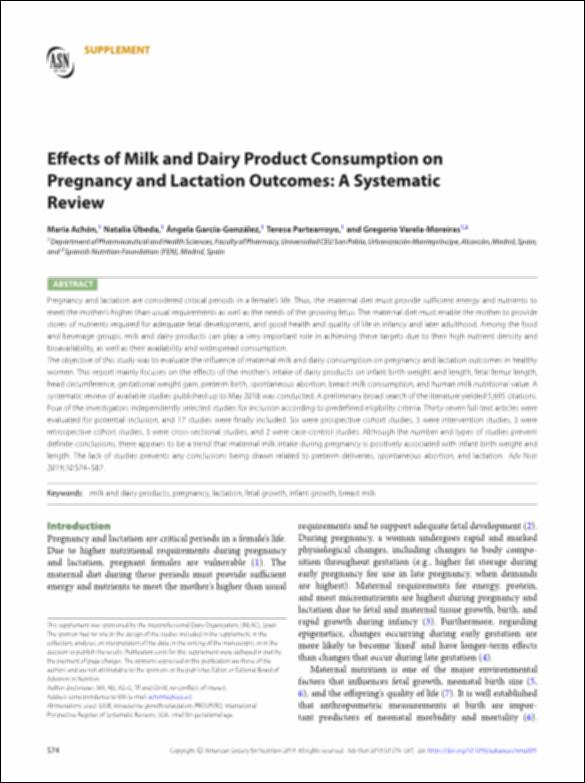Please use this identifier to cite or link to this item:
http://hdl.handle.net/10637/14898Effects of Milk and Dairy Product Consumption on Pregnancy and Lactation Outcomes: A Systematic Review
| Title: | Effects of Milk and Dairy Product Consumption on Pregnancy and Lactation Outcomes: A Systematic Review |
| Authors : | Achón y Tuñón, María Úbeda Martín, Natalia García González, Ángela Partearroyo, Teresa Varela Moreiras, Gregorio |
| Keywords: | Milk and dairy products,; Pregnancy; Lactation; Fetal growth; Infant growth; Breast milk |
| Publisher: | Elsevier |
| Citation: | Effects of Milk and Dairy Product Consumption on Pregnancy and Lactation Outcomes: A Systematic Review. Achón M, Úbeda N, García-González Á, Partearroyo T, Varela-Moreiras G. Adv Nutr. 2019 May 1;10(suppl_2):S74-S87. doi: 10.1093/advances/nmz009.PMID: 31089739 |
| Abstract: | Pregnancy and lactation are considered critical periods in a female’s life. Thus, the maternal diet must provide sufficient energy and nutrients to meet the mother’s higher than usual requirements as well as the needs of the growing fetus. The maternal diet must enable the mother to provide stores of nutrients required for adequate fetal development, and good health and quality of life in infancy and later adulthood. Among the food and beverage groups, milk and dairy products can play a very important role in achieving these targets due to their high nutrient density and bioavailability, as well as their availability and widespread consumption. The objective of this study was to evaluate the influence of maternal milk and dairy consumption on pregnancy and lactation outcomes in healthy women. This report mainly focuses on the effects of the mother’s intake of dairy products on infant birth weight and length, fetal femur length, head circumference, gestational weight gain, preterm birth, spontaneous abortion, breast milk consumption, and human milk nutritional value. A systematic review of available studies published up toMay 2018 was conducted. A preliminary broad search of the literature yielded 5,695 citations. Four of the investigators independently selected studies for inclusion according to predefined eligibility criteria. Thirty-seven full-text articles were evaluated for potential inclusion, and 17 studies were finally included. Six were prospective cohort studies, 3 were intervention studies, 3 were retrospective cohort studies, 3 were cross-sectional studies, and 2 were case-control studies. Although the number and types of studies prevent definite conclusions, there appears to be a trend that maternal milk intake during pregnancy is positively associated with infant birth weight and length. The lack of studies prevents any conclusions being drawn related to preterm deliveries, spontaneous abortion, and lactation. Adv Nutr 2019;10:S74–S87. |
| URI: | http://hdl.handle.net/10637/14898 |
| Rights : | http://creativecommons.org/licenses/by/4.0/deed.es |
| ISSN: | 2156-5376 |
| Issue Date: | 15-May-2019 |
| Center : | Universidad San Pablo-CEU |
| Appears in Collections: | Facultad de Farmacia |
Items in DSpace are protected by copyright, with all rights reserved, unless otherwise indicated.


